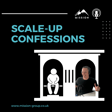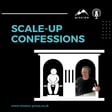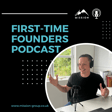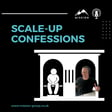Become a Creator today!Start creating today - Share your story with the world!
Start for free
00:00:00
00:00:01

What to do if you suck at financial and operational forecasting
In this episode of the First-time Founders Podcast, Rob explains why so many Founder suck at financial and operational forecasting, why that's a problem and how to get better at predicting your organisation's future.
Interested listeners can reach Rob (https://www.linkedin.com/in/robertliddiard/) at Rob@mission-group.co.uk (or to book some free time, visit https://www.eosworldwide.com/rob-liddiard). Alternatively, if you'd prefer Rob to send you a free copy of Traction (the book by Gino Wickman which explains The Entrepreneurial Operating System) just complete the form here: https://www.eosworldwide.com/traction-giveaway?implementer_email=rob.liddiard@eosworldwide.com
Transcript
Introduction to First Time Founders Podcast
00:00:00
Speaker
Hello, welcome to another episode of the First Time Founders Podcast, the show where we talk about how to start a business from nothing and grow it into something meaningful. I'm Rob Lydiard. I was the founding CEO of a software business called Yapster that was acquired at the end of 2022. I'm now a professional implementer of the Entrepreneurial Operating System, or EOS, which means I work with entrepreneurs and entrepreneurial leadership teams to help them get what they want from their businesses.
Navigating the Highs and Lows of Founding
00:00:26
Speaker
That's my day job, but in my spare time, I love talking to entrepreneurs and entrepreneurial people about the first time founder journey. Because those of you that have done it, and indeed those of you that are contemplating it, will find that it can be a pretty lonely gig. And there are some incredible highs, but there are also some pretty deep lows. And quite a lot of the lows are avoidable once you know what you're doing. But of course, as a first timer, you don't know what you're doing mostly. Now, the truth is most first time founders actually are pretty headstrong.
00:00:55
Speaker
somewhat overconfident and don't tend to listen. So these episodes are as much about Catholicism for me as they are about helping you. um You're almost certainly going to ignore anything that I or anybody else says and make your own mistakes. That's half the fun of being a founder. That said, every week I try and do my best with my entrepreneurial friends to share the wisdom of our mistakes and successes so that you can hopefully accelerate your own journey um to entrepreneurial success and achieve whatever it is that you're trying to achieve from your life and business. Today, I'm doing another solo episode.
Setting and Achieving Targets: A Common Challenge
00:01:28
Speaker
I'm talking about predicting, hitting, setting and hitting targets today. And the reason that I've chosen to talk to you about this topic is within the last three months, um I've worked with a number of entrepreneurial organizations led by charismatic visionary founders that are just not very good at hitting financial targets.
00:01:49
Speaker
um And the founders are doing well, but ultimately that that uncertainty adds tremendous unnecessary stress to those founders. And I found myself repeating myself often with the the entrepreneurs in question that are asking me for advice on how to implement the entrepreneurial operating system to take the chaos out of their businesses, help them grow faster, feel more successful. And oftentimes it comes down to, we talk about five leadership abilities. one of which is the ability to predict accurately. And oftentimes it looks to me like the root of a lot of their troubles is their inability or unwillingness to predict. So I'm going to share my thoughts with all of you, not just those few that I've happened to be in a session room with ah this summer. Right, let's start with why it is that entrepreneurs are so often so bad at setting and hitting realistic targets.
00:02:43
Speaker
I think the reason is that great founding entrepreneurs, those that create something truly from nothing, in the very first days of the business, it's not about predicting accurately. It's about dreaming a future and persuading stakeholders, whether they be customers, investors, founding employees, to believe that the future can be different and you, perhaps with their help or money, can make that future come true. And the first test is really just like, can we get any traction? Can I get your support? And then can we achieve something in pursuit of this sort of big, bold dream or goal that the that the founders articulated?
From Vision to Execution: The Entrepreneurial Transition
00:03:24
Speaker
And that's enough. It's hard.
00:03:25
Speaker
and it would be fake predicting to to talk about very granular milestones between the overarching vision and the early, early, earliest traction. You simply don't know. And people that are over planners are usually not very good day one entrepreneurs because they just get too bogged down in thinking they have to have all the answers on day one. When the answers are just not knowable, you have to be kind of in the swim to be able to see the opportunities in and around the market. It's quite common that a business
00:03:56
Speaker
started by a founder but is actually quite different to the picture that he or she had in their head when they started on day one. So those very, very early stages are really all about experimentation and inspiration. That's fine. Now, I only work with founders that have have been in existence for a couple of years, their businesses have been in existence for a couple of years, and they found something, a handful of successful clients, customers, they've got some, you know, some scale in their organization, let's say 10 employees or, you know, a few hundred grand in subscription revenue or or predictable revenue. Before that,
00:04:37
Speaker
Focusing on operational discipline, like I mean, it won't hurt you unless you don't solve the the biggest problems around the kind of the creative challenge. But it's not going to make the massive a massive difference. But what happens is entrepreneurs that are good at that first stage usually um are too late to to change their perspective and grow into the next phase of managing and leading an organization that that's no longer just a creative dream. It's now about executing the dream, moving the dream forward. um marshalling and managing resources. That's completely different. Now, in that stage, being able to predict accurately is really important. But where founders get confused is there's quite a big chasm between the earliest days when you're just pitching a dream and running a public company where the stock market is going to crucify you if you don't hit a very accurate um quarterly earnings target. right Now, founders rightly sort of dismiss
00:05:36
Speaker
the sort of the board and the bureaucracy that is required to to deliver, to manage stock market expectations quarter to quarter. But particularly if they're if they're invest investor funded, They typically need to marshal upset amount of capital to hit milestones either to get profitable before they run out of money or to impress investors enough with their with their growth rate to be able to unlock a subsequent round of funding so the business doesn't go
Honoring Visions and Maintaining Growth
00:06:05
Speaker
bust. And so actually just inspiring people on the way in when they put the money in is is is only half the battle. We need to inspire them and then actually to some degree honor
00:06:16
Speaker
the vision that we've sold them, the promises that we've made them in order to unlock further support further down the line. And crossing that kind of maturity chasm is actually really difficult to do because the personality type that gets you going is very different to the personality type on that trajectory to hitting quarterly earnings numbers. And it's too easy for founder types to dismiss. So I was the worst predictor in the world. I was terrible at forecasting for for at least six of my eight years as as the CEO of Yapster. And the the reason is because I fell into the trap I've just described. I had to get the thing off the ground, raise some money, but never quite grew into to setting realistic expectations and then delivering them quarter on quarter. What I learned through implementing the entrepreneurial operating system in the end is that
00:07:02
Speaker
um we can think long-term and be appropriately vague whilst also being clear in the short-term what we're going to achieve and what is enough resources to get us there.
Goal Compartmentalization with EOS
00:07:11
Speaker
And the way we do that is we compartmentalize. So first in EOS, we set a 10 year target. So we're we're with our leadership team. Typically we're saying, what is the overriding North Star for this organization? And that North Star may very well be longer, be be further in the future um It may be divorced from our intended tenure of ownership or even employment in the company. We're not letting short-term investor horizons drive the determine the whole the whole vision for the company. So what's our tenure target? Where are we going? What could this thing become? that is that that that The idea of that is to be the most inspiring vision of the company. It'll be smart, so it'll be specific and measurable, you know achievable, realistic, time-bound.
00:08:01
Speaker
um But it's big, and you may or may not get there. It's plausible, but but it doesn't really matter too much if you don't get exactly to that. It's just an overriding destination. And then from there, what we're able to do is we're able to come back and set an interim milestone that's still slightly vague. We call that the three-year picture. So the three-year picture is getting a leadership team and potentially investors to be able to close their eyes and picture the same future. Where is this company going to be three short years from now? en route to the 10 year target that we just set. And the three years should be more plausible than the 10 year. But we don't have to have it all figured out. So in the software world, a classic example of a three year picture might be to happens a lot with the sort of sub 3 million recurring revenue.
00:08:48
Speaker
technology companies that I see, a lot of them don't have really great net revenue retention, i.e. their business kind of degrades over time and they have to keep adding new customers because the old ones are going to leave eventually. Whereas really great subscription businesses, their early customers keep growing more than enough to offset the customers that churn and leave the customer base. So each cohort is effectively growing value over the time. That's called net revenue retention. Now, a classic founder mistake, I call it a mistake because it leads to poor predicting, is they'll say, we need to get to 110% net revenue retention, i.e. each cohort of customers should be growing over time so that rather than that cohort shrinking in value, it grows. And they're like, you know, 10%. But they're at, at the time they set the target, they're at like, I don't know, somewhere between 70 and 90 revenue retention, let's say, right? So they actually, they do have a leaky bucket. And they say, in one year, we're gonna have changed it. But they don't actually specifically know
00:09:44
Speaker
the actionable things that are definitely going to fix their leaky bucket. And then what happens is within the year, they just haven't achieved that. It was a dream. Whereas for their three year picture, they could say, we're going to be a positive revenue retention business in three years and we're going to spend 36 months divided into threes. So we're going to spend every quarter obsessing about the drivers of revenue retention. And by the end of the year, we're going to have, let's say, a concrete plan. We're going to have solved, let's say, the top three
Realistic Goal Setting and Progress Tracking
00:10:16
Speaker
causes of of of the leaky bucket. So the three-year picture can be um can be inspiring but vague and something like a goal that is important, but you don't quite know how to hit yet. It should be in that three-year picture.
00:10:29
Speaker
Then when we set the one-year goal, a much more sensible one-year goal, rather than we're gonna have 110% revenue retention, but we don't know how, where they're very quickly gonna run out of time. So I haven't had enough time to figure it out, let alone make it happen. The one-year goal might be um we're gonna nail out ICP, our ideal customer profile, and all sales and marketing efforts are gonna be speaking exclusively to that ICP. by the end of this year. Because what that's going to do is it's going to set us up by the third year to ideally only have customer cohorts coming through that we've got a cat in hell's chance of holding onto. Because if you picture it, if if you're not clear on who your ideal customer profile is, or you are, but you keep selling proactively to non-target market prospects, you're going to have a problem in three years' time because those poor fit clients are going to churn out, right? And it's going to run contrary to your your revenue retention efforts.
00:11:25
Speaker
um So a great one-year goal would be exactly something like that. Or it might be that um we know that we're losing a certain number of users on the way in because our onboarding experience isn't very good. And we're pretty sure that that then makes those users really hard to activate and it increases the likelihood they're going to churn. So before the end of the year, we're going to have transformed the onboarding experience. We're going to set up self-serve, whatever it might be. Those are in controllable inputs that the founder can definitely make happen if they leave and manage their organization well. without an without holding them, making themselves hostage to the outcomes of those inputs, which may or may not end up hitting their revenue retention objectives. So the key point there is set the three year in a way that it gets you to your 10 year it's inspiring, but it can be a bit, and it can be a bit hazy.
Balancing Creativity with Execution
00:12:12
Speaker
Your one year, in my opinion, if you want to be a great business and good at predicting and marshalling the limited resources you've got, not missing your targets and putting yourself in a state of chaos and potential crisis where you're asking investors to prop you up, having missed your goals, as you set the one year goals where it's fully within your gift. And then of course, you've got your four sets of rocks, 90 day initiatives to run those experiments, get shit done in service of those one year goals. So we talked about you I alluded to some some classic initiatives like self-serve, like selling to ICP. If we talk about selling to ICP, the first rock might be, OK, marketing is going to exclusively run campaigns around this idea of target market. It's then going to take 90 days for that to come through, and sales are going to start following through that the subsequent quarter. And so you can see how, within the course of a year, a founder can be fully in control of the input deliverables.
00:13:06
Speaker
so that we can when we get to the end of the first year and we reflect on it and we see how well it's worked and we set our new one-year target, so we're effectively two years in from when we set the first three-year picture, we can know if our if our original three-year picture of the revenue retention piece is is plausible. And if it is plausible, then by with by the time we actually get to year three, our one year goal now becomes what was our three year picture and we are going to commit to that revenue retention objective. But we're doing it from a place of being informed. We spent the right amount of time figuring it out so that then
00:13:41
Speaker
we can actually make it happen in that third year. We're not just promising stuff that we have no idea how to deliver and then pulling our hair out and wondering why we can't hit any of our numbers. The numbers weren't realistic to begin with because you didn't understand the how. So it's all about compartmentalizing as a visionary founder. Where do I want to be in 10 years time? Where do I need to be in three years time? Roughly for that to be plausible, but it's not fixed in concrete. OK, what do I need my team to have accomplished in the next 12 months? That should be damn well fixed in concrete. OK, there can be some slides. Some things are going to happen. But you should go into it with every intention of hitting the one-year goal. And then you use your quarterly initiatives to make sure that that happens. The problem for founders quite often, and this was a problem for me, is they're quite good at pretending that they're target obsessed, particularly when raising money.
00:14:29
Speaker
but deep in their heart, their creatives, and they're typically quite loose, quite comfortable in uncertainty. That's actually really important to be a good visionary, always scanning the horizon when the facts change, they change. That's really powerful, but it's typically not not usually the spirit of someone that competes like hell, completes and finishes something on time. You know, like really great sales executives, really great integrators, COO, MD, even functional CEO types are usually maniacal about not setting, not moving the goalpost and and and getting shit done and winning and hitting the targets that were set to begin with. Founders just find it all too easy to to flake out and be like, okay, the world has changed. I'm going to change too. I've got,
00:15:14
Speaker
you know I'll give you a 5,000 word soliloquy as to why the world has changed and and what we originally said is no longer realistic, but you know let me distract you and inspire you with this new shiny shiny goal that we're also never gonna get to. And it works the first couple of times, but eventually investors, great employees, your key stakeholders, customers will start to lose confidence in you as a visionary if you just can't execute, if you don't have the traction underpinning the vision.
The Role of Integrators in Entrepreneurial Teams
00:15:42
Speaker
So if you're listening to this and you're thinking, okay, I want to get better at forecasting, I've understood the compartmentalization of the 10-year, the 3-year, the 1-year and then the 90 days, but in my heart, I know that I'm not going to hold myself and my organization accountable to not missing the 1-year goals, to not failing to make the most of every 90 days.
00:16:03
Speaker
You need an integrator, my friends. you need You need a counterpart in your leadership team that is maniacal about competing and completing. I posted something to LinkedIn this week. um soliciting contact from my various friends across the professional services universe. I was a lawyer by background before I got into being a founder. And i um now I work with a lot of entrepreneurial teams where they're implementing EOS, where they do need an integrator type personality in that COO, MDC, EOC. I see a lot of great characteristics across the legal accounting, corporate finance, management accounting universe.
00:16:39
Speaker
um where those people may have never run a business before, but EOS can cover some of those experience gaps, but they've got all the right temperament to set sensible goals and then smash through them and hit them and actually get into like hitting stretch targets rather than spending their life wondering why we can't deliver the the basic plan that we sold to investors, colleagues, and and customers. So um if you're an integrated type person listening, DM me, I'd love to talk to you about some of my founder friends that are preparing to hand the reins over to someone like you. And if you're a founder or an aspiring founder that's got a creative spirit and is never really gonna be you world-class at hitting targets, feel free to ping me as well. And maybe I'll hook you up with some of the some of the folks that are circling, looking to and to perform this role in in someone like yours life.




